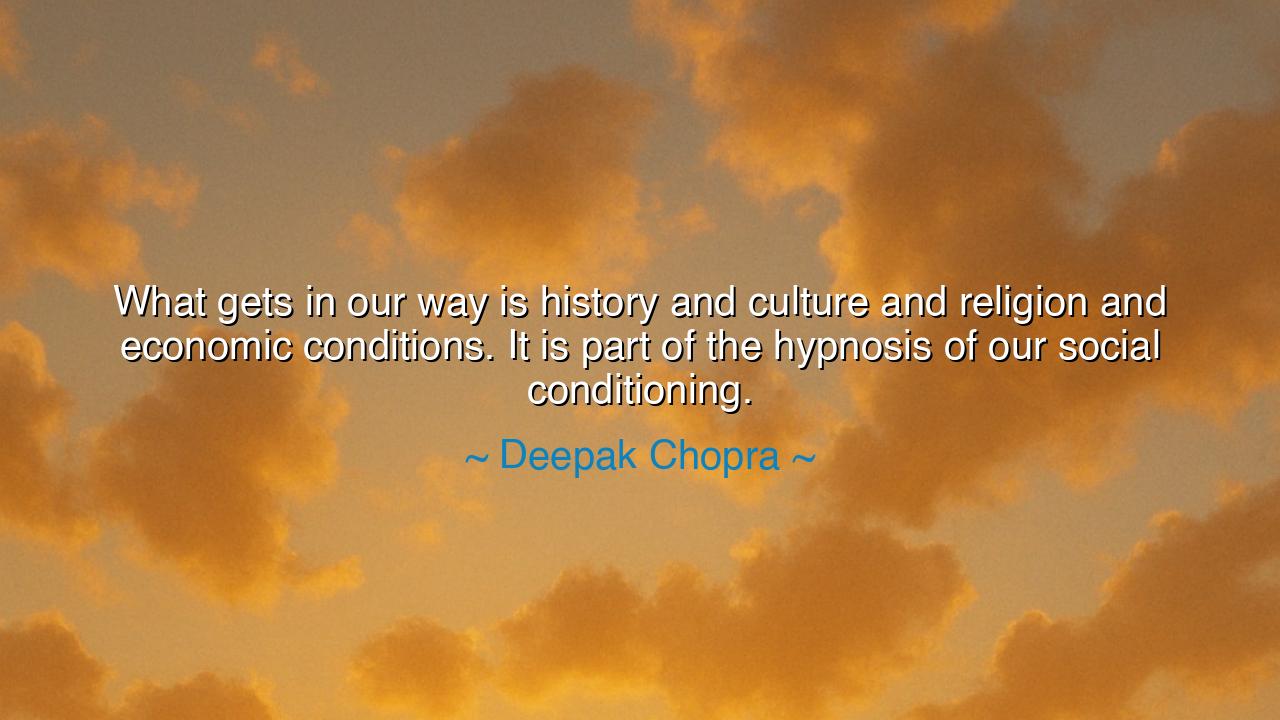
What gets in our way is history and culture and religion and
What gets in our way is history and culture and religion and economic conditions. It is part of the hypnosis of our social conditioning.






"What gets in our way is history and culture and religion and economic conditions. It is part of the hypnosis of our social conditioning." These words by Deepak Chopra offer a profound insight into the forces that shape our lives and perceptions, often in ways we don't fully recognize. Chopra argues that the very structures of history, culture, religion, and economic conditions—the systems in which we are born and live—can become barriers to our personal growth and spiritual awakening. These forces, which have existed for generations, act like a form of hypnosis, subtly conditioning our minds and limiting our ability to see the world and ourselves clearly.
In the ancient world, the concept of conditioning was not unfamiliar. Plato, in his famous allegory of the cave, described how individuals, chained in a dark cave, could only see the shadows on the wall. These shadows were their reality, shaped by the limited perception imposed by their environment. For Plato, the shadows represented the illusions of life, and true enlightenment came only when one broke free from these constraints and saw the truth—the light outside the cave. Chopra’s words echo this ancient wisdom: the societal systems we are born into can trap us in a limited understanding of reality, and it is only by breaking free from these mental constraints that we can experience true freedom.
Consider the story of Siddhartha Gautama, better known as Buddha, who was born into the privileged life of a prince. Yet, he was confined by the cultural norms and religious beliefs of his society, which taught him to accept the suffering and materialism that surrounded him. When Siddhartha ventured outside his palace and encountered old age, sickness, and death, he realized that the teachings of his culture and religion were incomplete and distorted. He saw how the hypnosis of social conditioning had shaped the lives of those around him. Rejecting the material constraints of his upbringing, he sought a path to liberation, ultimately finding it in the practice of mindfulness, meditation, and the questioning of societal norms. Buddha’s journey exemplifies the need to break free from the mental limitations imposed by culture and tradition to discover a deeper truth.
Similarly, in the life of Socrates, we find a man who also challenged the social conditioning of his time. Socrates lived in a world where society, religion, and politics were heavily interwoven, shaping the way people thought and acted. Socrates’ commitment to questioning and examining the established truths of his society—often mocking the status quo—made him an outcast. His belief in the need for personal inquiry and the freedom of thought ran directly counter to the social hypnosis of ancient Greece. Socrates’ teachings remind us that it is necessary to question the assumptions laid before us by history, culture, and religion to reach a higher understanding of truth and existence.
In more recent history, the Civil Rights Movement led by Martin Luther King Jr. serves as another powerful example of breaking free from the social conditioning that oppressed millions of African Americans. King’s leadership was based on the conviction that the racism embedded in the very culture and economics of America was a form of hypnosis that had blinded people to the equality and dignity of all human beings. King, deeply influenced by his Christian faith, called for a new way of seeing the world—a way where people were judged not by the color of their skin, but by the content of their character. His nonviolent resistance was a direct challenge to the cultural and economic systems that had conditioned people to accept inequality. His life was a testament to the power of breaking free from societal hypnosis to create a world rooted in justice and love.
Chopra’s words serve as both a warning and a call to action—a reminder that while we are shaped by the forces around us, we are also capable of transcending them. The conditioning of society does not need to define our lives, and by awakening to the truth of our individual and shared existence, we can break free from these barriers. The ancient wisdom of Socrates, Buddha, and King teaches us that to liberate ourselves, we must engage in self-inquiry and challenge the norms and systems that seek to limit our potential.
The lesson from Chopra’s words is that the forces of culture, religion, and economic conditions are not inherently negative, but they become limiting when we blindly accept them as absolute truths. To live freely and authentically, we must continually question these societal norms and evaluate how they influence our thoughts and actions. Only through this process of self-reflection and awareness can we begin to live a life that is not determined by the limitations of the past, but by our own will and truth.
In practical terms, we can take this lesson by examining the ways in which we have been shaped by the world around us. What beliefs, behaviors, or fears are we carrying that were imposed by society, family, or culture? By identifying these influences, we can begin the process of liberating ourselves from the hypnosis of social conditioning. Whether through meditation, journaling, or dialogue, we must commit to the unyielding pursuit of truth, freedom, and personal growth. Let us not merely follow the paths laid before us, but actively choose our own way—one of awareness, empowerment, and authenticity.






AAdministratorAdministrator
Welcome, honored guests. Please leave a comment, we will respond soon